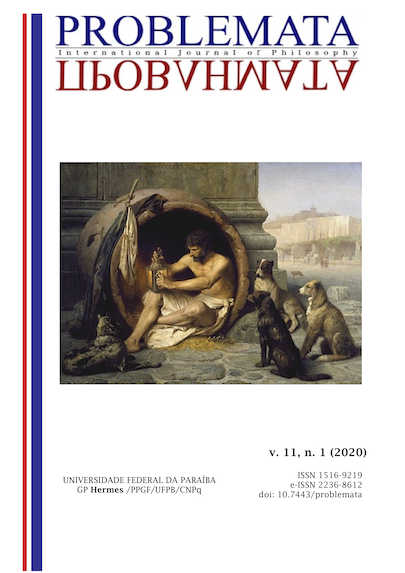CRITICIZES THE NOTION OF EMANCIPATION IN HABERMAS
DOI:
https://doi.org/10.7443/problemata.v11i1.51577Keywords:
Emancipation, Rationality, Habermas, Rancière, DisagreementAbstract
Our aim is to present the conception of disagreement in Jacques Rancière as a criticism of the Habermasian conception of emancipation, which has as one of its central elements the ideas of language, reflection, interaction, consensus interest. The article is an excerpt from the thesis The emancipation theory in Karl Marx and Jürgen Habermas, defended by the Integrated Postgraduate Program in Philosophy - PIPGF / UFPBUFPE-UFRN under the guidance of prof. Dr. Edmilson Alves de Azevêdo. Organizing themselves in such a way that, in the first moment, we present the relationship between rationality and emancipation, in a second moment we develop a critique of the Habermasian conception of emancipation.
Downloads
References
ARISTÓTELES. A política. 2ª Ed. Trad. Nestor Silveira Chaves. Bauru: Edipro. 2009.
BAUMAN, Zygmunt. Por uma sociologia crítica: Um ensaio sobre senso comum e emancipação. Trad. Antônio Amaro Cirurgião. Rio de Janeiro: Zahar Editores, 1977.
KOSELLECK, Reinhart. Historias de conceptos: Estudios sobre semántica y pragmática del lenguaje político y social. Madrid: Editorial Trotta. 2012.
RANCIÈRE, Jacques. O desentendimento: política e filosofia. Trad. Ângela Leite Lopes. São Paulo: Editora 34, 1996.
_____. O mestre ignorante: cinco lições sobre emancipação intellectual. 3ª Ed. Trad. Lílian do Vale. Belo Horizonte: Autêntica Editora, 2015.
VIETTA, Silvio. Racionalidade uma história universal: cultura europeia e globalização. Trad. Nélio Schneider. Campinas: Editora da Unicamp, 2015.
Downloads
Published
Issue
Section
License
Authors who publish with this journal agree to the following terms:
- Authors retain copyright and grant the journal right of first publication with the work simultaneously licensed under a Creative Commons Attribution License that allows others to share the work with an acknowledgement of the work's authorship and initial publication in this journal.
- Authors are able to enter into separate, additional contractual arrangements for the non-exclusive distribution of the journal's published version of the work (e.g., post it to an institutional repository or publish it in a book), with an acknowledgement of its initial publication in this journal.
-
- Authors are permitted and encouraged to post their work online (e.g., in institutional repositories or on their website) prior to and during the submission process, as it can lead to productive exchanges, as well as earlier and greater citation of published work (See The Effect of Open Access).





